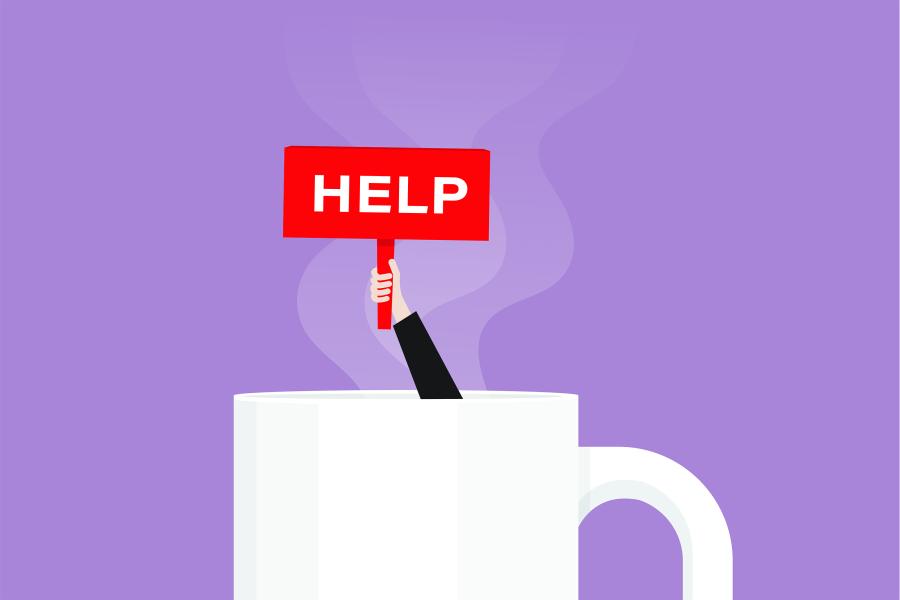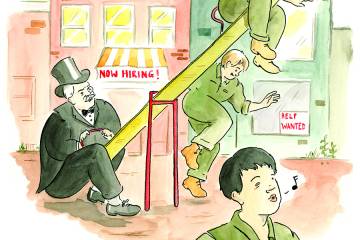- Name
- Johns Hopkins Media Relations
- jhunews@jhu.edu
- Office phone
- 443-997-9009
From Bartleby the Scrivener telling his 18th-century employer "I would prefer not to" to George Costanza setting up a nap station beneath his desk in the 1990s, "quiet quitting"—broadly understood as a retreat from workplace ambition—is not a new concept. But the alliterative buzzword born on TikTok is novel in the scope of the national conversation it has launched, one that CEOs can't ignore.
The term has taken on a life of its own, with multiple interpretations, but there is consensus that the quitting part is not literal. Under any definition, quiet quitting means remaining in one's workplace while not actively going above and beyond.
For workforce expert Rick Smith, professor of practice and vice dean of education and partnerships at the Johns Hopkins Carey Business School, the rise of a social media workplace sentiment to mainstream attention is a story in itself. "How can something go from TikTok to the Wall Street Journal and the Harvard Business Review? It's fascinating to see the groundswell support for a new workplace concept," he says. "I'm wondering, what's next? What other workplace trends are we going to see from a bottom-up approach? How will this change the way we think about the future of work?"
The Hub reached out to Smith for thoughts on quiet quitting and its workplace opposite, quiet firing.
What's the deal with quiet quitting?
We're seeing this phrase being used in two different ways. One concept is removing yourself from the climb-the-ladder mindset or decelerating the career ambition to focus more on other aspects of life. This is often considered as a rebalancing. We sometimes see this with new parents, for example, who realize, "There's so much more to life than working myself to death." Certain life events can also trigger this type of rebalancing, such as 9/11 attacks. While this concept is not new, the phrase quiet quitting has caught on as it perhaps captures the impact of the pandemic on the lives of many people. Around the world, we see many people making life changes as a result of their experience and reflection during COVID-19.
The other way that the term quiet quitting is being used is less positive in nature. In this context, people are not happy with their job or employer and may think, "My job is awful, I don't like my company, so I'm going to quit putting in effort, but keep the paycheck." In this interpretation, people are doing the bare minimum, perhaps a step short of actively trying to get fired.
Because of these two very different meanings, the conversations about quiet quitting can be unclear. These two ways of thinking about the same term can create confusion.
Is quiet quitting the right name or should it be called something else?
Keeping with the idea of an alliteration to describe the phenomenon, "career coasting" and "boundary balancing" address aspects of the first definition. In this case, a person may temper ambitions while still meeting expectations by taking measures to contain work hours and managing work-life pressures.
The other meaning could be called "revenge recalibrating." In that case, a person may be using the work modalities or talent shortages to take advantage of the employer by not working to full potential. "Cyber-loafing" is also a term we've seen used to describe people who are doing other things while working online.
As you said, these ideas aren't new, so why do you think the phrase quiet quitting is striking such a chord now?
In my field, we talk about workforce effects in different ways. There's one phenomenon called the "cohort effect," and that's when an entire population experiences life-changing events at the same time. If we go back in U.S. history, we see the cohort effect with the world wars and the Great Depression. These are significant events that change people's outlook and mindset. The coronavirus pandemic has been a cohort effect as it affected the entire population. As a result, the concept of quiet quitting is resonating because it has been a time of reflection as people reassess their priorities and consider the fragile nature of humanity. We have also seen new emphasis on well-being, which feeds into the idea of people taking better care of themselves.
Some researchers have focused on generational differences in the workplace. While we may see Gen Z leading the quiet-quitting conversation, the concept is resonating with older generations as well. Some people have become tired of running the rat race and may be downsizing to simplify their lives. It is noteworthy however, that the revenge recalibrating concept of quiet quitting and the "don't try" mindset is receiving some backlash from older workers who have previously poured their time and energy into their jobs. There is still a sense that young workers should be focused on getting the right start in their careers by working hard.
How does quiet quitting relate to the other huge employment trend we've seen, "The Great Resignation"?
Not everyone has the option to leave their employer or make changes. In these cases, people may work to re-balance. In some situations, there may only be one viable employer in town, or people may be in a field with few job openings, or it may not be a good time to relocate. So, what does one do? Perhaps this is when we see people recalibrate priorities.
Are there downsides to quiet quitting?
I think employees need to consider the long-term impact of their actions. Most people take pride in what they do and naturally have dreams and aspirations they wish to accomplish. People may think, "Wouldn't it be great to be the boss someday?" or "I'd like to earn a certain salary so I can afford to do something." Pulling back or career coasting early in life could bring consequences that affect the long-term career path, earnings, and expectations. It's important think about future satisfaction as well as the situation today.
Quiet quitting could also stir up internal tension for some people, particularly high achievers. As much as one may want to scale back on work, it is easy to still feel that pressure to create a good work product and maintain status, not to mention avoiding the potential for letting down colleagues. The internal narrative might be, "I promised myself I wouldn't do this, but here I am working at 10 p.m. to finish this presentation because it's not where it needs to be, and this is a reflection of my work."
Now we're hearing about employers passively pushing workers out. What is "quiet firing"?
This is something that employers have done for many years, and sometimes the human resource processes may encourage this by segmenting talent. If the employer does not see high performance or potential with an employee, they may not make investments in that person for the future (e.g. training, career development, etc.). We might view this as, "We're not going to fire you, but we're not going to do anything to encourage you to stay."
How should employers respond to quiet quitting?
It seems that many employers have more work to do as they consider the impact of the pandemic on workplace well-being. Some workplaces are allowing more remote work, more flexibility, and new models of working. However, many organizations have not addressed the well-being needs that people used to find in the workplace that may not be available. Much of this has to do with social interaction, psychological safety, and the social cohesion of the office that creates a sense of belonging. So how do employers foster that in our new reality?
Personally, I think that employers that are working to create deliberate and informal interactions are on the right track. It is important to create and foster a workplace culture that keeps people engaged and motivated toward goals. It is a good opportunity to re-recruit employees and discuss what creates a mutually beneficial arrangement to create a positive outlook toward work. This happens not through elaborate company-wide events but more casual interactions with people at an individual level. It is good to include how to create more purposeful opportunities for people to get together to collaborate, innovate, or socialize. After all, change happens one person at a time.
Posted in Voices+Opinion, Politics+Society
Tagged business, social media, workplace









